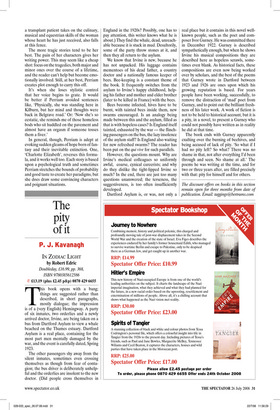The pity of it
P. J. Kavanagh
IN ZODIAC LIGHT by Robert Edric Doubleday, £16.99, pp. 368, ISBN 9780385612586 ✆ £13.19 (plus £2.45 p&p) 0870 429 6655 This book opens with a bang; things are suggested rather than described, in short paragraphs, mostly dialogue; the impression is of a (very English) Hemingway. A party of six inmates, two orderlies and a newly arrived doctor, Irvine, are being taken on a bus from Dartford Asylum to view a whale beached on the Thames estuary. Dartford Asylum is a real place, containing for the most part men mentally damaged by the war, and the event is carefully dated, Spring 1923.
The other passengers shy away from the silent inmates, sometimes even crossing themselves as though from fear of contagion; the bus driver is deliberately unhelpful and the orderlies are insolent to the new doctor. (Did people cross themselves in England in the 1920s? Possibly, one has to pay attention, this writer knows what he is about.) They find the whale, dead, unreachable because it is stuck in mud. Desultorily, some of the party throw stones at it, and then they all return to the asylum.
We know that Irvine is new, because he has not unpacked. His luggage contains mementoes of his dead father, a country doctor and a nationally famous keeper of bees. Bee-keeping is a constant theme of the book. It frequently switches from the asylum to Irvine’s happy childhood, helping his father and mother and elder brother (later to be killed in France) with the bees.
Bees become infected, hives have to be burnt, with tainted bees inside them, new swarms encouraged. Is an analogy being made between this and the asylum, filled as that is with hopeless cases? Is England itself tainted, exhausted by the war — the flinching passengers on the bus, the lazy insolence of the asylum staff? Is England also waiting for new refreshed swarms? The reader has been put on the qui vive for such parallels.
However, the questions mount. Why are Irvine’s medical colleagues so uniformly awful, coarse, cynical careerists; and why do they dislike the tight-lipped Irvine so much? In the end, there are just too many questions unanswered; the terseness, the suggestiveness, is too often insufficiently developed.
Bookshp_pc_.
Dartford Asylum is, or was, not only a real place but it contains in this novel wellknown people, such as the poet and composer Ivor Gurney. He was committed there in December 1922. Gurney is described sympathetically enough, but when he shows Irvine his musical compositions they are described here as hopeless scrawls, sometimes even blank. As historical facts, these compositions are even now being worked over by scholars, and the best of the poems that Gurney wrote in Dartford between 1923 and 1926 are ones upon which his growing reputation is based. For years people have been working, successfully, to remove the distraction of ‘mad’ poet from Gurney, and to point out the brilliant freshness of his later work. A work of fiction is not to be held to historical account, but it is a pity, in a novel, to present a Gurney who could not possibly have written as in reality he did at that time.
The book ends with Gurney apparently exulting over the burning of beehives, and being accused of lack of pity. ‘So what if I had no pity left? So what? There was no shame in that, not after everything I’d been through and seen. No shame at all.’ The poems he was writing at the time, and for two or three years after, are filled precisely with that: pity for himself and for others.
The discount offers on books in this section remain open for three months from date of 37 AM Pe 1 publication. Email: taggings@bertrams.com


























































 Previous page
Previous page